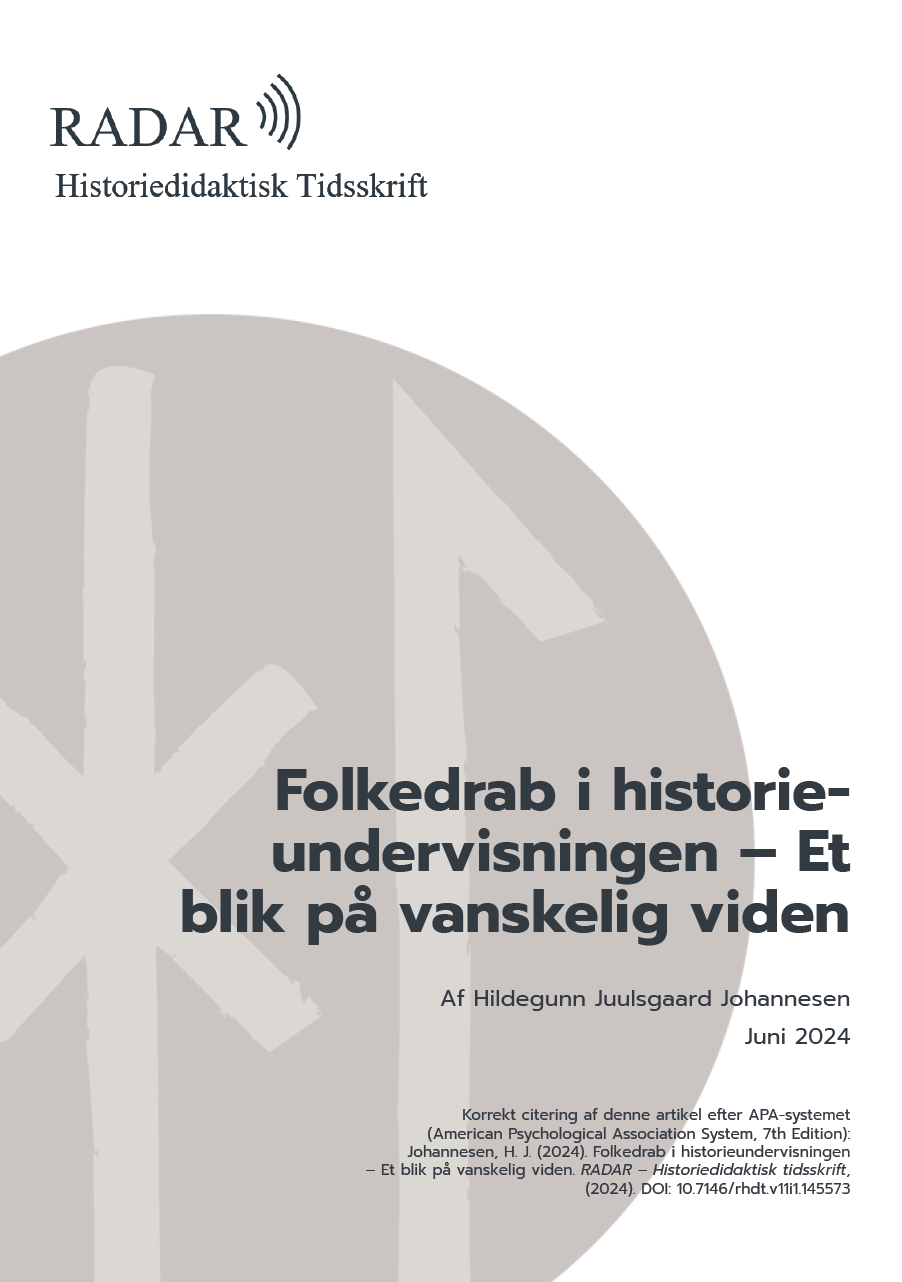Folkedrab i historieundervisningen – Et blik på vanskelig viden
DOI:
https://doi.org/10.7146/rhdt.v11i1.145573Abstract
Som en del af regeringens indsats mod antisemitisme er holocaust blevet en integreret del af det eksisterende kanonpunkt: Augustoprør og jødeaktion 1943 (Børne- og Undervisningsministeriet, 2022). Dette indebærer, at elever i den danske folkeskole skal møde undervisning om folkedrab i løbet af deres skoletid. På baggrund af det, jeg fandt ud af i min ph.d.-afhandling, om hvordan elever påvirkes, vil jeg i artiklen reflektere over, hvordan en lærer i klasseværelset bedst håndterer det, at alle elever nu skal undervises i holocaust.
References
Bjerg, H. (2014). The Culture of Memory in the “Grandchildren Generation” in Denmark. I: H. Bjerg, C. Lenz & E. Thorstensen (red.), Historicizing the Uses of the Past: Scandinavian Perspectives on History Culture, Historical Consciousness and Didactics of History Related to World War II (s. 241-256). Bielefeld: Transcript Verlag.
Bormann, N. (2018). The Ethics of Teaching at Sites of Violence and Trauma: Student Encounters with the Holocaust. Palgrave Macmillan US.
Britzman, D. P. (1998). Lost Subjects, Contested Objects: Toward a Psychoanalytic Inquiry of Learning. State University of New York Press.
Børne og Undervisningsministeriet. (2022). Nyt kanonudvalg om Holocaust er nedsat. Lokaliseret på: https://www.uvm.dk/aktuelt/nyheder/uvm/2022/jun/220615-nyt-kanonudvalg-om-holocaust-er-nedsat
Chinnery, A. (2019). The bearing of historical consciousness. Historical Encounters, 6(1), 96-109. https://doi.org/10.52289/hej6.100
Crane, S. A. (2008). Choosing Not to Look: Representation, Repatriation, and Holocaust Atrocity Photography. History & Theory, 47(3), 309-330. https://doi.org/10.1111/j.1468-2303.2008.00457.x
Etisk Råd. (2013). Hvad er etik? Lokaliseret på: https://etiskraad.dk/undervisning/gymnasieskolen/introduktion-til-etik/hvad-er-etik
Garrett, H. J. (2011). The Routing and Re-Routing of Difficult Knowledge: Social Studies Teachers Encounter When the Levees Broke. Theory & Research in Social Education, 39(3), 320-347. https://doi.org/10.1080/00933104.2011.10473458
Garrett, H. J. (2017). Learning to be in the World with Others: Difficult Knowledge & Social Studies Education. Peter Lang.
Johannesen, H. J. (2022). Kontroversielle aspekter i historieundervisningen 7.-9. klassetrin: Et etnografisk inspireret klasserumsstudie. [Ph.d.-afhandling, Syddansk Universitet]. Syddansk Universitet. https://doi.org/10.21996/y7s8-sd95
Misco, T., Kuwabara, T., Ogawa, M. & Lyons, A. (2018). Teaching Controversial issues in Japan: An exploration of contextual gatekeeping. The International Education Journal: Comparative Perspectives, 17(4), 68-82.
Pitt, A. & Britzman, D. (2003). Speculations on qualities of difficult knowledge in teaching and learning: an experiment in psychoanalytic research. International Journal of Qualitative Studies in Education, 16(6),755-776. https://doi.org/10.1080/09518390310001632135
Simon, R. I. (2011). A shock to thought: Curatorial judgment and the public exhibition of ‘difficult knowledge’. Memory Studies, 4(4), 432-449. https://doi.org/10.1177/1750698011398170
Wibaeus, Y. (2010). Att undervisa om det ofattbara: En ämnesdidaktisk studie om kunskapsområdet Förintelsen i skolans historieundervisning. [Ph.d.-afhandling, Stockholms Universitet]. Stockholms Universitet.

Downloads
Published
How to Cite
Issue
Section
License
Ophavsretten til artiklerne i RADAR deles mellem forfatter og tidsskrift.
Artikler publiceret i RADAR må citeres, downloades og videresendes for ikke-kommerciel brug, under forudsætning af normal akademisk reference til forfatter(e) samt tidsskrift, årgang, nummer og sider. Artiklerne må kun genudgives med eksplicit tilladelse fra forfatter(e) og tidsskriftet.

